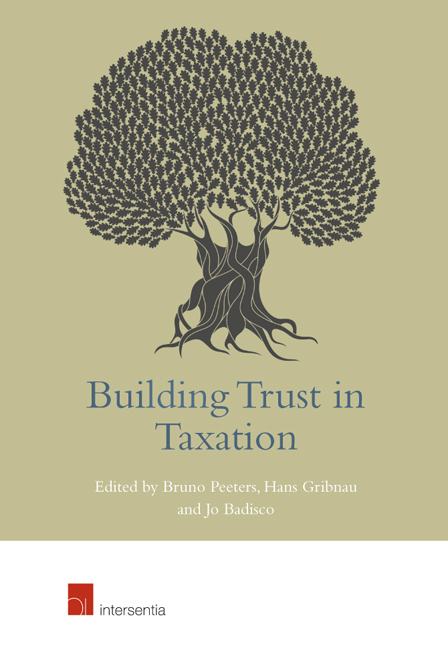Book contents
- Frontmatter
- Preface
- Contents
- List of Authors
- Introduction
- PART I TAXATION, STATE AND SOCIETY: RECIPROCITY AND THE LIMITS OF THE POWER TO TAX
- PART II Trust and morality: tax governance in need of transparency
- Taxation and Ethics: an Impossible Marriage?
- An Overview of Political Economy Issues in Taxation and Tax Reforms
- Trust in the Tax System: The Problem of Lobbying
- Restoring Stakeholders’ Trust in Multinationals’ Tax Planning Practices with Corporate Social Responsibility (CSR)
- PART III International taxation: in search of democratic legitimacy
- PART IV Behavioural aspects of taxation and trust
Restoring Stakeholders’ Trust in Multinationals’ Tax Planning Practices with Corporate Social Responsibility (CSR)
from PART II - Trust and morality: tax governance in need of transparency
Published online by Cambridge University Press: 21 September 2018
- Frontmatter
- Preface
- Contents
- List of Authors
- Introduction
- PART I TAXATION, STATE AND SOCIETY: RECIPROCITY AND THE LIMITS OF THE POWER TO TAX
- PART II Trust and morality: tax governance in need of transparency
- Taxation and Ethics: an Impossible Marriage?
- An Overview of Political Economy Issues in Taxation and Tax Reforms
- Trust in the Tax System: The Problem of Lobbying
- Restoring Stakeholders’ Trust in Multinationals’ Tax Planning Practices with Corporate Social Responsibility (CSR)
- PART III International taxation: in search of democratic legitimacy
- PART IV Behavioural aspects of taxation and trust
Summary
ABSTRACT
This contribution discusses the tax planning behaviour of big corporations and investigates Corporate Social Responsibility (CSR) as a tool to battle the issue. It will be argued that certain legal tax planning strategies of multinationals are not acceptable to local communities and the public in general. If this unacceptability line is crossed, stakeholders might lose trust in a company. This, in turn, can cause reputation damage and various related costs for multinationals. Therefore, multinationals should, as it will be argued, think about possibilities for (re-)building stakeholder trust in a company.
The author explains that trust is based on a belief that a company makes solid moral decisions that do not harm the other party. Therefore, companies should make solid moral decisions that do not harm stakeholders also when it comes to their tax planning strategies. But how to do that? It will be suggested that they look at CSR for help. As will be argued, with CSR corporations can prove that their decision-making considers in addition to economic and legal values also society and its moral values as a whole. For applying CSR in tax planning practices, both procedural and substantive elements will be proposed. From the procedural perspective, companies should be more transparent about their strategies, and from the substantive side, good tax governance should take into account ethical considerations. Thus, ethically sound decision-making reflects the behaviour of a trustworthy company and should, therefore, help to reinforce stakeholders ‘ trust.
INTRODUCTION
International corporate tax planning has become a heavily debated topic in the media, politics, and academia. On the one hand, the main message (e.g. in the media 1 and politics) has been that multinational corporations (MNCs or multinationals) do not pay enough tax. On the other hand, the opponents of such accusation doubt whether this is possible, since MNCs act according to the law (except in the case of tax evasion) and follow their business interest. This dilemma has offered a wide range of discussion points and also brought several vague and sometimes even misleading ideas and terminology into the debates.
- Type
- Chapter
- Information
- Building Trust in Taxation , pp. 173 - 202Publisher: IntersentiaPrint publication year: 2017
- 6
- Cited by



